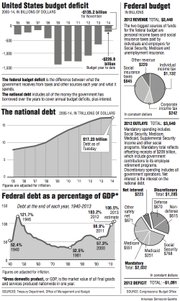WASHINGTON - The federal budget deficit last month narrowed more than economists forecast as rising employment and a rallying stock market boosted revenue to a November record.
Spending exceeded revenue by $135.2 billion, compared with $172.1 billion in November 2012, the Treasury Department said Wednesday. The median estimate in a Bloomberg survey of 17 economists was for a $140 billion gap. Receipts rose 12.8 percent to the highest ever for the month, while spending fell 4.8 percent.
Declining unemployment has helped reduce the country’s deficit as a share of gross domestic product by more than half in the past four years to $680.3 billion in the fiscal year ended Sept. 30 from a record $1.42 trillion in 2009. The Congressional Budget Office has projected the shortfall will shrink further this fiscal year and next as stronger economic growth lifts individual and corporate taxes.
“We’ve seen spending come down and tax receipts outperforming, based off of a little bit better economic growth,” said Michael Brown, an economist at Wells Fargo Securities in Charlotte, N.C. “As long as we maintain a pace of job growth that is consistent with what we’ve seen over the last couple of months, that trend of increase in revenue should continue.”
Wednesday’s report showed revenue increased to $182.5 billion last month from $161.7 billion in November 2012. Spending totaled $317.7 billion compared with $333.8 billion a year earlier, it showed.
Individual income-tax receipts rose to $82.7 billion from $75 billion in November 2012, the report showed.
The deficit totaled $226.8 billion in the first two months of fiscal 2014, compared with a $292.1 billion shortfall in October-November last year, according to the report.
The yield on the benchmark 10-year Treasury note was 2.84 percent at 2:23 p.m. in New York, compared with 2.80 percent late Tuesday.
The Treasury sells bills, notes and bonds to finance the government’s operations. Issuance of net marketable debt will be $266 billion this quarter, compared with the borrowing of $297 billion from October through December last year, according to Treasury data compiled by Bloomberg.
A Labor Department report last week showed employers added more workers than economists forecast in November and the jobless rate dropped to a five-year low of 7 percent.
The 203,000 increase in payrolls followed a revised 200,000 advance in October, according to the Friday report. The median forecast of 89 economists surveyed by Bloomberg called for a 185,000 advance.
“As the labor market improves, more households are pushed into higher tax brackets,” said Dean Maki, chief U.S. economist at Barclays in New York. “We expect the trend of fiscal improvement to continue over the next couple of years and this is mainly due to the economic expansion.” Information for this article was contributed by Heidi Przybyla of Bloomberg News.
Front Section, Pages 2 on 12/12/2013

